Natural Homemade Dish Soap That Works
This post may contain affiliate links. Read disclosure policy.
This natural homemade dish soap recipe is so easy to make, smells wonderful, works amazingly well, saves you money, and is environmentally friendly. How much better can it get? Not only will it cut through grease, but it’s safe for you and your family.
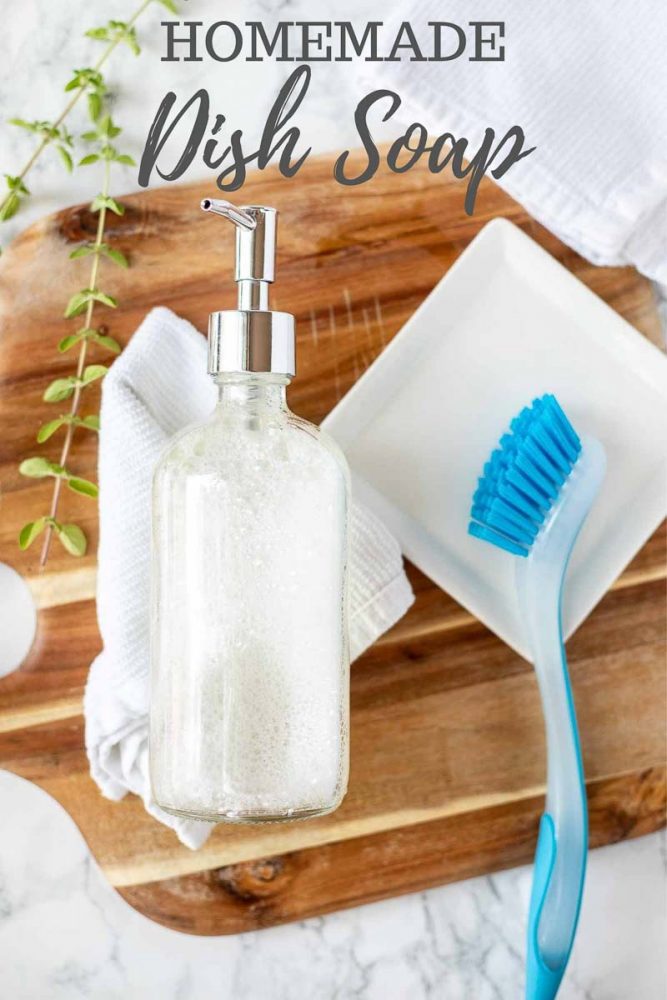
This natural dish soap is a new twist on a very old recipe on the blog.
I did some tweaking to fix some problems that were coming up, and the new results are so much better! No more grating a bar soap with inconsistent results.
So many people find that homemade cleaners don’t work as well as their chemical counterparts, but I can assure you that this one works well.
It’s tough on grease and suds up amazingly well, making it easy to enjoy this natural switch.
It is also cheaper than typical, natural dish soaps, which usually cost around $4 per 25 oz. This one will set you back around $3. So, slightly cheaper.
It also has a better rating from the EWG website. I’ve tried a few of the store-bought, natural dish soap options, and I find them to be disappointing, and you need a lot of it for it to work.
However, I still love to use the store-bought options in this really effective DIY Stain Remover.
We’ve loved this natural DIY dish soap recipe in our house. Getting used to the consistency takes a little adjustment, and you don’t have to use very much for great results.
I promise you, this recipe works great, and your dirty dishes will become remarkably clean.
Why you will love this recipe:
Actually works: Greasy dishes stand no chance with this homemade version.
Natural ingredients: Commercial dish soap contains many harmful ingredients that are known endocrine disruptors like fragrance. When it comes to finding a natural store-bought dish soap, I like to check the EWG (environmental working group) website to see the healthiest options. Transitioning to natural cleaning products is a great way to reduce your exposure to harmful chemicals and create a healthier home environment.
Easy: The good news is making your own homemade dish soap is way easier than you think. Using a liquid soap like sal suds, makes this process much easier. No grating, boiling down ingredients, mixing for long periods or using special equipment (like an immersion blender).
Eco-friendly: Not only will you reduce your environmental impact by cutting down on plastic packaging, but also contribute to a more eco-friendly cleaning routine for a healthier planet and home.
Customizable: Making your own dish soap also allows you to customize the scent and strength of the soap to suit your preferences and cleaning needs.
Cost effective: More cost-effective option in the long run, as many of the ingredients needed are often pantry staples or easily accessible at local stores.
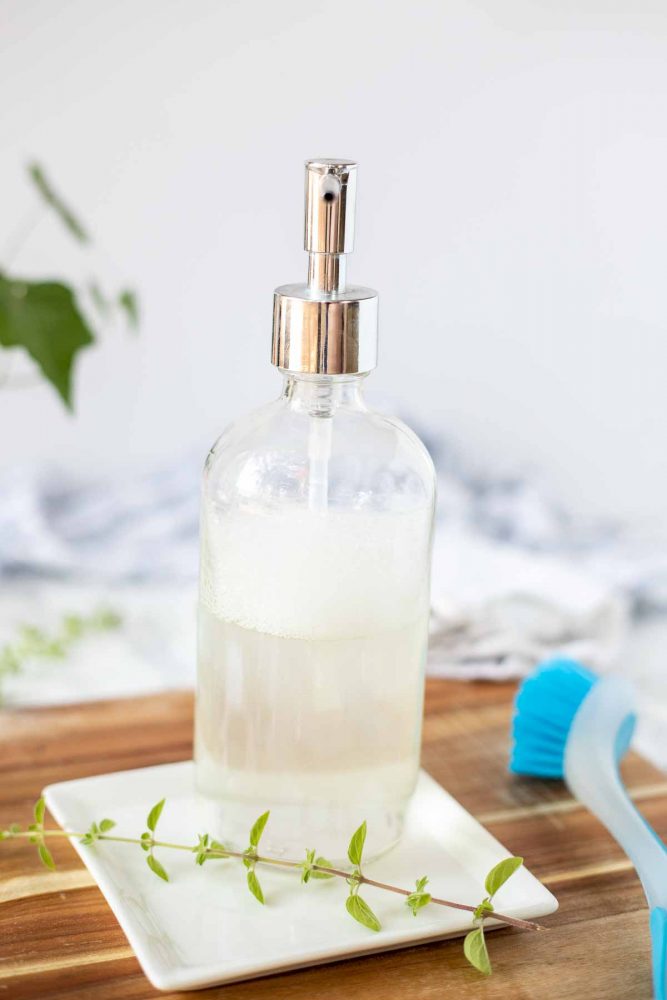
Tips:
- The consistency is much thinner than regular dish soap, and a little bit goes a long way. Just because it is runny doesn’t mean it is ineffective.
- You can place it in a soap pump, foaming soap pump, or just put it in an old, dish soap bottle.
- You may have to shake it up a little before you use it, but it shouldn’t clump and separate like the last recipe!
- Don’t substitute the sal suds for liquid castile soap. Since this recipe contains vinegar, it will not work with castile soap.
The following are affiliate links. We are a participant in the Amazon Services LLC Associates Program and other affiliate programs that are designed to provide a means for us to earn fees by linking to Amazon.com and affiliated sites.
Tools you may need:
Measuring spoons
Spoon
Soap dispenser. A foaming pump dispenser works the best. I like to use a glass rather than plastic bottles when using essential oils, because oils can break down the plastic.
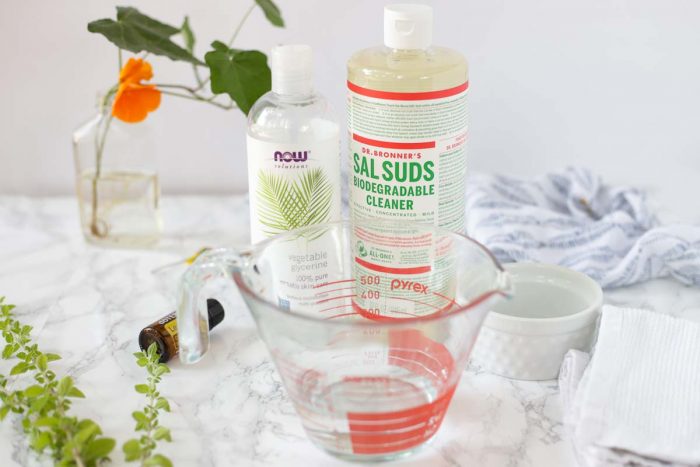
The Ingredients:
- Dr. Bronner Sal Suds – This is like the ultra-concentrated, cleaning power of Castile soaps (which is a staple in any natural-living cabinet, hello, hand soap). This mild detergent is powerful and works amazingly well to clean dishes without any soap scum or residue. It can also be used to clean floors, counters, laundry, and more. It also works great in hard water (something we struggle with here at our house).
- Some people don’t like the fact that it contains sodium lauryl sulfate, and believe it to be carcinogenic. According to the company, it is a processed ingredient made from coconut that studies find have no carcinogenic effects (source).
- This is also different from castile soap, which doesn’t work very well for cleaning (and can’t be used in conjunction with vinegar, which this recipe contains). Castile soap is a soap that is meant to be used for personal care and better for your skin, while sal suds is a mild detergent.
- Water – I would recommend using distilled water or water that was boiled and cooled to help reduce the chance of bacterial growth.
- Vinegar – Helps cut grease and provides a streak-free shine.
- Vegetable glycerin (optional) – This helps create more sudsing power and helps moisturize your hands.
- Your favorite essential oils (optional): Twenty drops of your favorite essential oils. Ones used specifically for cleaning are my favorite. This is citrus oils, pine, tea tree, spruce essential oil, etc.
Essential Oils
Essential oils not only add a pleasant scent to your dish soap, but also offer additional cleaning and antibacterial properties.
Save This Recipe
Lemon essential oil or citrus essential oil. One of my favorites to add since citrus oils work great as a degreaser to get those dishes squeaky clean.
Other essential oils have antibacterial properties. Optional: 10-20 drops of On-Guard, Thieves, or tea tree oil (anti-bacterial; if you like the smell you can add more, if not, add less). You can really play around with different essential oils to find your favorite.
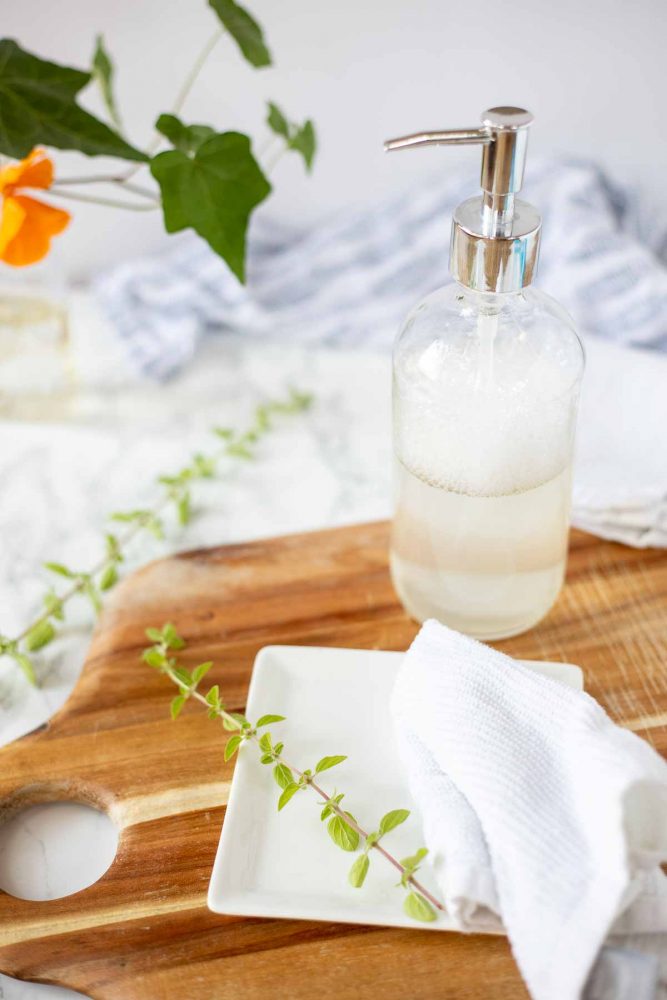
How To Make Natural Homemade Dish Soap:
If not using distilled water, bring water to a boil for a few minutes and then let it cool down a bit before starting the next step.
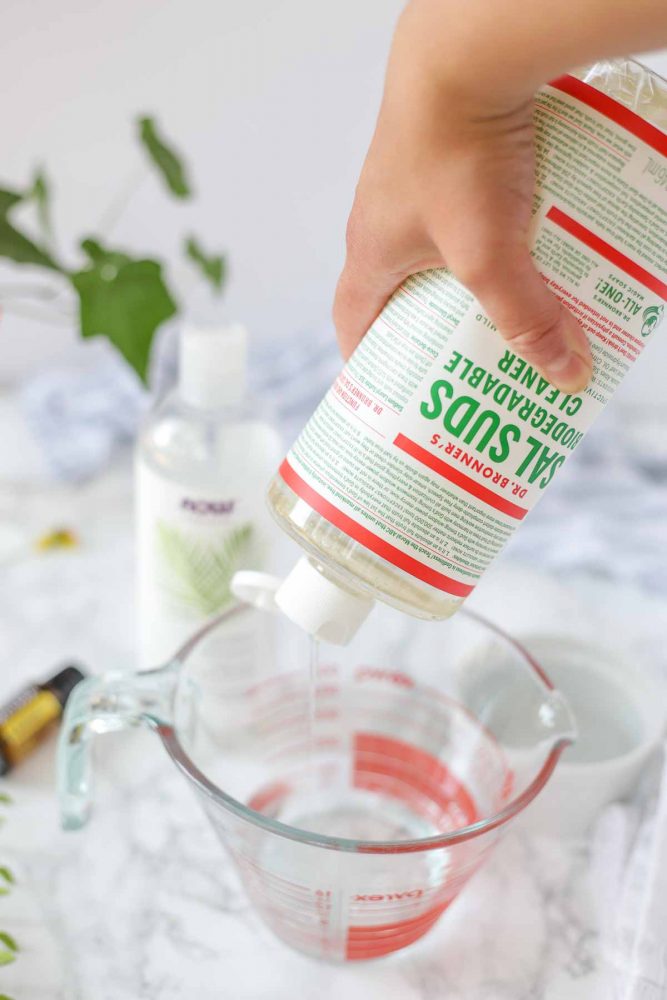
n a medium-sized bowl, combine all of the ingredients and stir well.
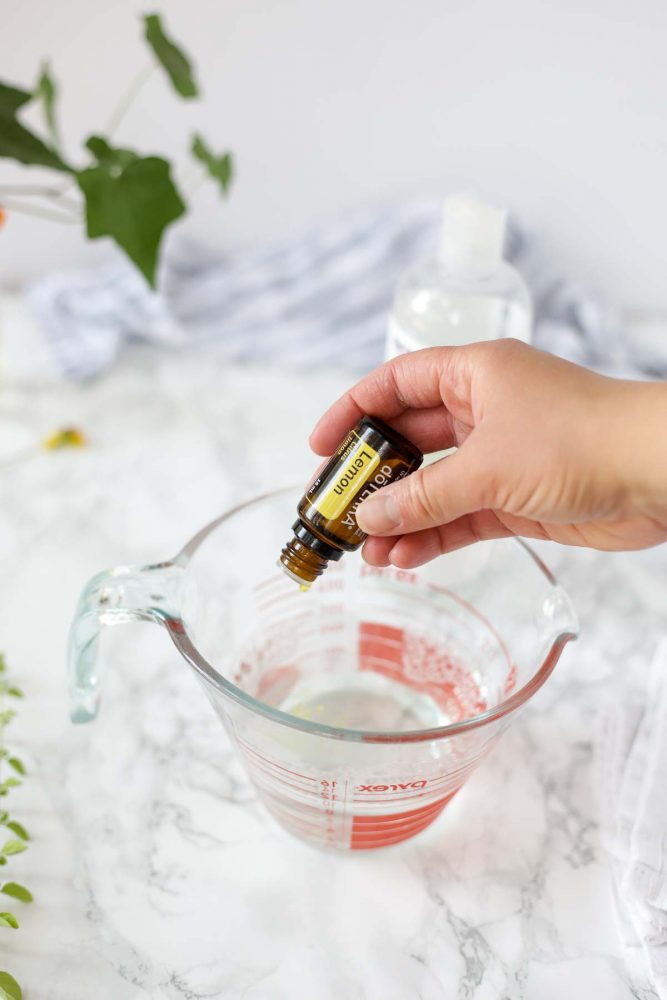
Add 20 drops of essential oil. I like to use citrus oils, like lemon, because it is tough on grease. You can also use anti-bacterial type oils like On-Guard or Thieves. Tea tree would also work well.
Pour homemade soap into a foaming soap dispenser. You can also use mason jars or another container, but a foaming dispenser is what I found to work the best.
That’s it! Wasn’t that easy? You do like two minutes of work and you’re done.
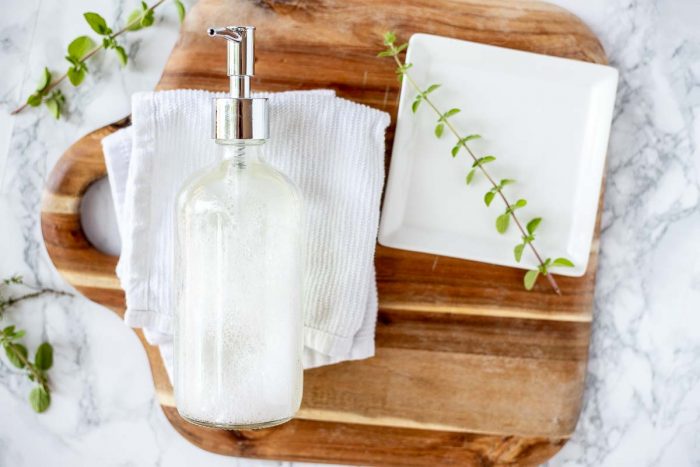
Variations:
Citrus: Add 20 drops of lemon, grapefruit, mandarin, etc.
Lavender mint: One of my favorite combos adds about 15 drops of lavender and 5 drops of peppermint.
Holiday: I love Christmas tree smells with pine, Siberian fir, Douglas fir, etc. Or that classic holiday smells of clove, cinnamon, orange, and Douglas fir.
Herbal mint: Add mint (or spearmint) and eucalyptus.
Tips For Using This DIY Dish Soap
- Be sure to shake the bottle before each use to ensure the ingredients are well mixed.
- When washing dishes, use a small amount of soap as a little goes a long way with these concentrated formulas.
- For tough grease or baked-on food, allow the soap to sit on the dishes for a few minutes before scrubbing.
- Additionally, consider using a natural bristle brush or sponge to help with scrubbing power without scratching delicate dishes. After washing, be sure to rinse thoroughly to remove any soap residue (luckily sal suds are very biodegradable and have been approved for gray water systems).
FAQ
You can in a pinch, but I would recommend this foaming hand soap to use instead because it is much more gentle on your hands.
Or this natural hand sanitizer while you’re out and about.
Vinegar alone can not replace dish soap because it does not break down fats like soap will.
Hand soaps usually contain other ingredients that will leave residue on your dishes like skin softeners and fragrances. They will not rinse off leaving a bad taste in your mouth.
Yes you can, but I found it not a super effective dish detergent. Dishes would still have grease or residue left after using it. Sal suds is a much more effective cleaner for dishes.
Would I be in a pinch if I had nothing else? Yes I would.
Find More Homemade Cleaning Products That Work!
- All-Purpose Cleaner (that can also be used on glass!)
- DIY Furniture Polish
- Homemade dishwasher detergent
- Glass-Cleaner
- Homemade Laundry Detergent
- 15 House Cleaning Tips For A Naturally Clean Home
- Homemade Granite Cleaner
If you’ve tried and loved this recipe, make sure to come back and give it 5 stars and tag me on Instagram @ablossominglife.
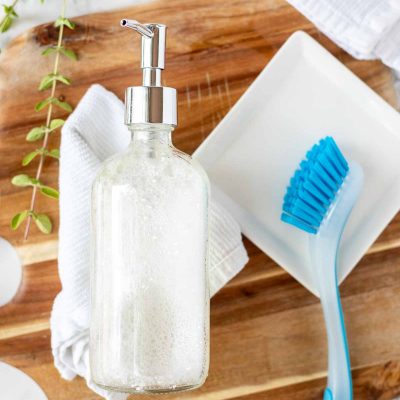
Homemade Dish Soap
Save This Recipe
Equipment
- Measuring cup and spoons
Ingredients
- 3/4 cup distilled water or water that was boiled and cooled
- 1/2 cup sals suds
- 2 tbs whtie vinegar
- 1 tbs vegetable glycerin
- 20 drops essential oils
Instructions
- If not using distilled water, boil water for a few minutes and then allow to cool.
- In a medium-sized bowl, combine all of the ingredients and stir well.
- Add essential oils and stir. I like to use citrus oils (like lemon) because it is tough on grease.


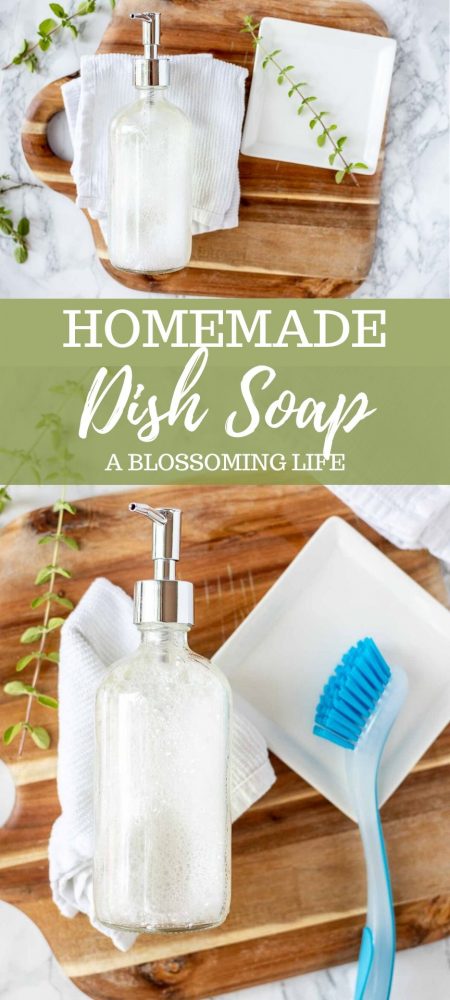
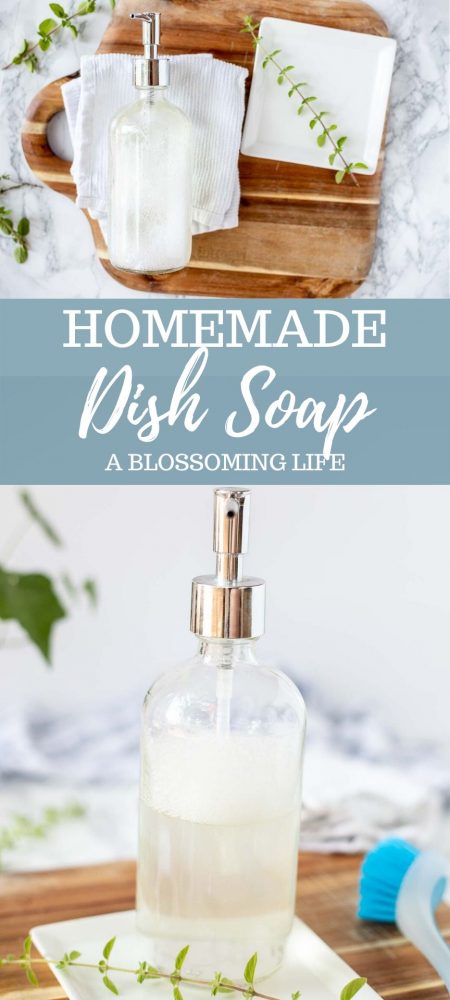
I am finding that this is the consistency of a (I’m sorry for being gross) booger! I don’t like that aspect of it. It creates a film on everything I use it on, and I followed the directions to a tee….I’m not sure what happened, did I do something wrong or is everyone’s this way? I’ve also made hand soap and it’s the same boogery consistency. :-/
I have had the same problem – gross consistency, film, all of that.
Well I’m glad I’m not the only one!!! I wonder if that’s just what this is and we aren’t liking it, or if we didn’t do something right!?!
O no Im sorry it didn’t work for you! I know it definitely has the boogery consistency I state that in the post! But I don’t have an issue with a film! I wonder if you could add borax to it if that would help
Me too. I feel guilty that it didn’t work, but it just flat out didn’t. I just went black to my Palmolive
I’m a fan of the Walmart generic that looks like Dawn. Less than $2 a bottle and good stuff.
Hehe I get my stuff from Costco, so it’s a lot for very little
I am new at this and was wondering how the top to the mason jar was made.
How neat! I will have to try it.
That’s a brilliant idea I will have to ry this.
amy if I wanted to use the liquid version of the soap how much would I add? I didnt get the bar kind
I’m not sure you probably could use it straight or a 2 to 1 ratio with the soap being the higher amount!
Ok, thanks Amy, I will try the 2/1 ,and let you know
And why don’t you use the liquid Castile? Just curious. I had already pinned this recipe, just haven’t tried it yet. Have pinned several others, as well (like unpaper towels!). Making dishwasher detergent now and LOVING it. Would be great to use this as the drops on top of the powder, rather than Dawn. Thanks for the heads-up that it is non-sudsing. My laundry detergent doesn’t suds, either, but have been using it for well over a year (Maryjane’s recipe from Beehive Cottage, with OxiClean added), I LOVE both the way it works AND the huge cost savings. My goal is to get everything unnatural or bleach-related out of our home. Thanks again for helping me on that quest. 🙂
I don’t like the consistency of the liquid kind. Its too watery and I feel like you have to use a lot of it because of the thickness. Cheryl that is a great goal! I hope this works for you!
Just a quick note on the essential oils. All citrus essential oils are photosensitive, meaning for the next 24 hrs after use, you’re very sensitive to the sun, which can result in a sunburn of varying degrees. Also, I know some people bathe their pets using Dawn, and if you decide to use this in the same way, know that most animals’ livers can’t process essential oils. You can end up killing them, especially cats and reptiles. (I know you’re not promoting/recommending/suggesting anyone bathe their animals in this. I just know people who wash their pets in dish washing liquid.)
Hi, I was wondering where you buy your Castile soap?
I actually buy it at our local neighborhood coop. But you should be able to buy it at almost any grocery store!
Perfect! Thanks a bunch! 🙂 can’t wait to try it! I tried one not too long ago(a different recipe), and it gave everything a nasty oily layer, I had to use my Palmolive to get the nasty film off! Can’t wait to try this one!! 🙂 thanks for sharing.
O no! I hope that doesn’t happen to you with this recipe!!!
I am just getting in to making my own cleaners at home. The floor and dusting recipe I found and love calls for dawn. Do you think this would work in place of that?
As long as it doesn’t have vinegar or lemon juice in it I would think it should work!
Can you use vinegar with pure soap or do they cancel each other out, does anyone know?
Amy if I was to use the liquid version how much would I use? and would I still add the water,and if so how much?
Wonderfull & easy recipe..
I am gonna make this today..
You’re close with this recipe but if you’d add vinegar then it would be perfect. Vinegar cuts grease and helps keep residue from forming on the dishes.
If you use castile soap you can’t add the vinegar because they will cancel each other out. But if you use a different kind of soap I totally agree with you that vinegar would add a great element to it!
How about if you use pure soap. Could you use vinegar in the dishwashing liquid or just for the rinse? Or do they cancel each other out too?
Hi Amy, just wondering if washing soda would make this dish soap more effective?
It could! I didn’t add it because washing soda can make things really thick and was afraid it would thicken it to much. Maybe if you added more water to the recipe it would work!
Hi Amy,
Do you have a post about how you turned your canning jar into one with the soap pump? That would be great. Thanks!
-Kate
Im sorry Kate I don’t! I bought mine at an antique store in Kentucky! I know I’ve seen it on pinterest! Sorry I can’t be more help
Great idea Amy! Thanks, I’ll look some up.
What a great recipe! I’d love for you to share this post at Healthy 2day Wednesdays!
Thanks Rachel! I just linked up! Thanks for the invite
I am definitely going to be trying this — no dishwasher here except me so I go through alot of soap. Thank you!
Visiting from the Barn Hop.
You poor thing! Dishes are my enemy lol! At least this makes it a little more enjoyable!
I was JUST looking up a recipe for this kind of soap! What a great thing that you linked this up to Whimsy Wednesday! Thank you:)
Perfect timing! Thanks for hosting such a great hop Kelly!
So…if you’re making your own soap and the first ingredient is “soap”…can we really call this DIY? Plus the soap you are using is awesome on its own, and far more expensive than Dawn.
Do you have a recipe that really is DIY? I love the idea of adding Tea Tree oil, I have a water and Tea Tree oil concoction that I use all over my house (cleaning, disinfecting etc.)
Thanks!
*less.
Well it still DIY because your making liquid soap from a bar. I agree this soap is awesome and even though the bar is more expensive making into a liquid makes it cheaper than Dawn. Its only about $1.20 ish for 32 oz of this stuff where Dawn is $4.47 for 30 oz. Thats a pretty big savings! I’ve tried other recipes and this one works much better! If you really wanted it to be completely diy you could make your soap and use it?? Possibly!
Hi,
Both of your dish liquid recipes call for tea tree oil do you know if it is possible to replace it with something else natural? No it isn’t the smell, it has a tendency to break me out.
Gaia
Yep you could use lavender essential oil, and possibly lemon or orange. Another person said that lemon or orange essential oil are not acidic enough to negatively effect the soap!